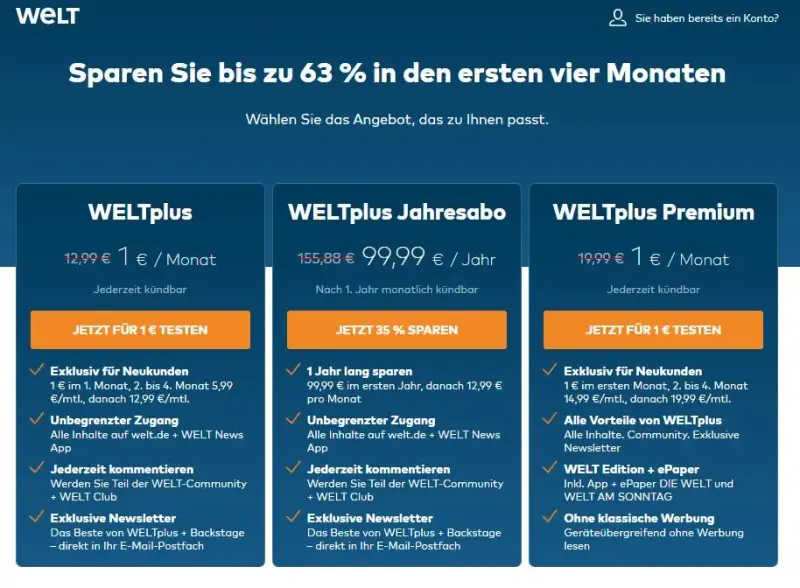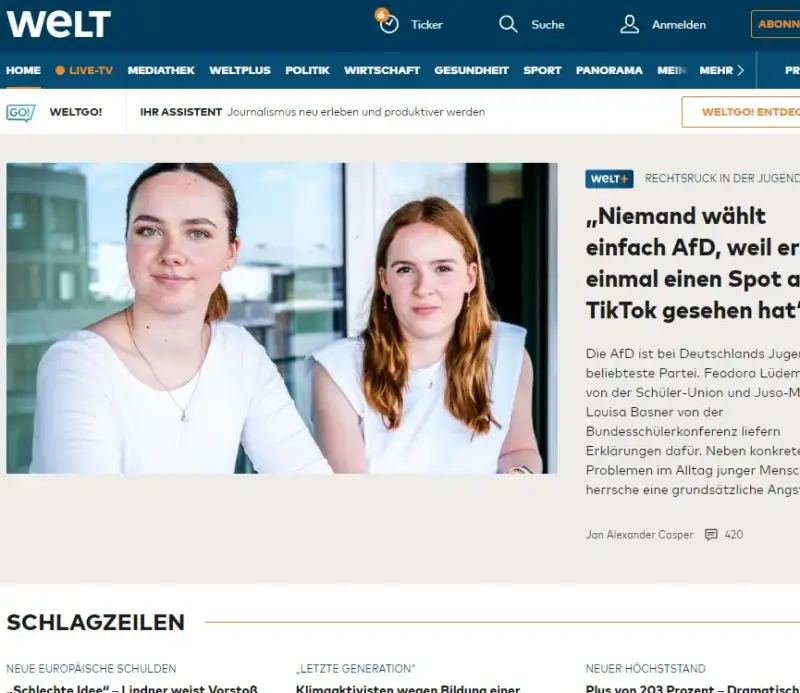
German quality newsbrand Welt has accepted the limits of its potential subscriber base and is throwing its efforts behind revenue, not volume.
Welt, which is owned by Axel Springer, first launched a digital subscription strategy with a metered paywall in 2012. Four years later it moved to a freemium model and today about 50% of articles on its website and app are for paying subscribers only.
Welt now has about 225,000 subscribers of which 14% are print and digital and 86% are digital-only.
Falk Schneider, director of premium at Welt, told Press Gazette the newsbrand is about 80% of the way through its digital transformation and is now in a “very good situation”.
But he said it is unlikely for the newsbrand to reach 400,000 or 500,000 subscribers within the next three years.
He added: “When we hit 200,000 we recognised it’s really hard to get volume growth after 200,000 so we needed an answer on this, so we set up this shift focusing more on revenue instead of volume. This was in the year 2022.”
Schneider said the same applies to its quality competitors in the German market including Der Spiegel, Die Zeit, Frankfurter Allgemeine Zeitung (FAZ) and Süddeutsche Zeitung.
Die Zeit had 297,000 digital subscribers in May last year. Süddeutsche Zeitung reached 250,000 digital subscribers by March 2023. FAZ crossed 120,000 digital subscriptions to its app F+ in October 2022.
Schneider said for each of them it would be “quite difficult to gain such a high number of digital subscribers. So all these brands focus on price and developing and fostering their brand they already have.”
He added that it is “clear” what each of these brands “stands for” in the German media landscape. Welt’s focus is on politics, economy, debate and culture and it deprioritises other areas like entertainment.
Schneider said: “In our strategy, quality journalism and sustainable subscriptions are closely linked along the core of the brand. Both components from my perspective are mutually dependent – one will not work without the other.”
How Welt subscriber strategy differs from Axel Springer sister title Bild
Welt’s strategy differs from its Axel Springer sister title Bild, a German tabloid newsbrand. Press Gazette heard in February that Bild had more than 707,000 digital subscribers and that Daniel Mussinghoff, director of premium for Bildplus, felt there is still “huge potential” to grow.
Schneider pointed out that Bild is “focused on volume” and getting revenue out of the volume but for Welt it is the other way around.
“We are a quality newspaper so we can set another price point compared to Bild.”
A full-price Weltplus subscription costs €12.99 per month or €155.88 per year and its Weltplus Premium offering, which is additionally ad-free and includes the e-paper, is priced at €19.99 a month.
For comparison, Bildplus costs €7.99 but users first get 12 months at €1.99. This means that as well as being cheaper Bild allows a longer trial period than Welt, which currently gives monthly Weltplus subscribers one month at €1 then three months at €5.99 before going to the full price.

Schneider said the “most important rule” in the current strategy is “revenue before volume” and gaining more revenue out of Welt’s existing customers. As a result Welt is currently in the middle of pricing up its customers to higher prices.
He said they accept that they will “have to take some churn”, adding: “If there is enough revenue we are fine with losing some volume and maybe getting these users back by win-back campaigns and so on over time.
“But for the moment of the price increase we are fine to lose some of our customers to get effectively more revenue out of our cohorts. So this also, from my perspective, is the clear way to deliver on our strategy.”
Four ‘lock-in tools’ for Welt subscribers
As well as providing access to Welt’s paywalled articles, the subscription gives users the ability to comment on articles and to use its new AI assistant Weltgo. Schneider described these as two key “lock-in tools” for boosting subscriber engagement, alongside the app and newsletters.
He described the ability to comment 24/7 as a “USP” for Welt users in the German market. Almost four in ten (38%) respondents to a user survey agreed with this at the end of 2023, up from 32% a year earlier.
Schneider said people like it because they want to “state out their point of view”, they want their “moment of glory” from likes and replies, and they like to see “authors or correspondents from our editorial departments are dealing with the ideas and the comments from our customers”.
Improvements to the Welt community experience in the past year were awarded second place in the product iteration category at the International News Media Association’s Global Media Awards in April. Users had become frustrated when moderators took a long time to accept their comments, with some citing this as a reason for cancelling their subscription.
The AI moderation process has now improved, with staff dealing mainly with the more ambiguous comments – for example those using irony or sarcasm. The rate of comments directly approved by AI jumped from 40% in August to 75% in December while users reported problems due to approval time fell from 12% in July to 1%.
Welt’s journalists have also become more involved in the discussion around their articles: Welt authors submitted around 30,000 comments in 2023, up 50% compared to 2022.
As a result “community” as a reason for cancelling a Welt subscription fell from 22.2% in June to 9.8% in December.
Community at Welt also includes the ability for subscribers to take part in both in-person and virtual events with its journalists.
April saw the launch of the AI assistant Weltgo, built on ChatGPT4 and Welt’s own archive, for paid subscribers only. The idea is it provides a “new way of getting information”, Schneider said, for example by asking for a daily news briefing or a summary of a story as a Q&A. But it is also designed to make life easier with other everyday tasks such as writing emails or deciding what movie to watch with the family.
According to Schneider, it has already seen strong engagement with existing subscribers – on a par only with subscriber marketing about something like a competition to win a holiday.
But, he added, there is still “some homework to do” and the team are aware it is “not a sprint, it’s a marathon”.
“I said we are 80% of the way to digital transformation. Here we are at 5% of the way up to 100,” he continued.
“And we learned it’s not that acquisition case, so it’s not easy to gain new subscribers by offering the AI assistant… It’s more the engagement case and this was what we supposed and the numbers showed us we were right with our estimation.”
AI is also being used to help build several of Welt’s newsletters, cutting down the time it takes for journalists to create one from three to four hours to 20 to 30 minutes. Schneider said: “They really gain a lot of time. So there is no argument ‘I do not have time, I cannot deliver a newsletter’. This argument doesn’t work anymore.”
Both Welt’s AI-assisted and totally human-made newsletters have open rates above 60%, above industry averages, according to Schneider (although changes at Apple have led to open rates being seen as a “flawed and unreliable measure”).
Schneider’s fourth “lock-in tool”, the app, has clear engagement benefits over the website. A quarter of customers who subscribed via the web use the Welt app – but they are responsible for more than 50% of total page views. A key target for 2024 is to increase that 25% using the app.
In the past year Welt has undergone numerous major infrastructure projects, for example changing its payment management platform and sign-in structure. Now it wants to move on to some other improvements, such as its checkout process and the login for registered users. Separately another aim is to enter the B2B business, seen as a potential area for additional revenue.
Amid this focus on subscriber engagement, Welt still publishes the Sunday newspaper Welt am Sonntag, described by Schneider as profitable and “our most important print product”, and the daily newspaper Die Welt. “Our challenge was and still is to transform our print readers into digital users and also our whole brand and the editorial staff,” he said.

Email pged@pressgazette.co.uk to point out mistakes, provide story tips or send in a letter for publication on our "Letters Page" blog
